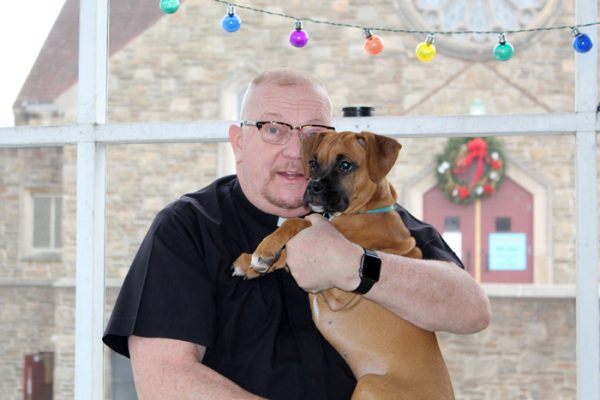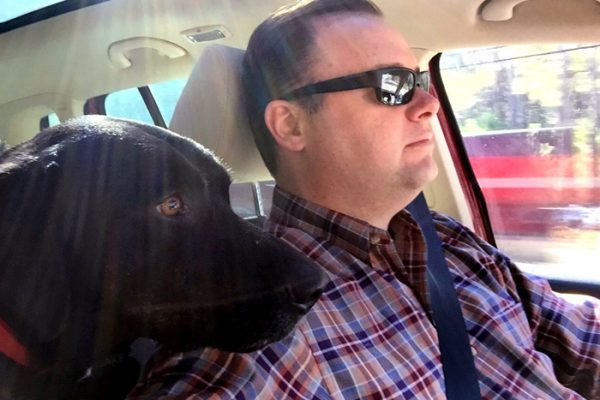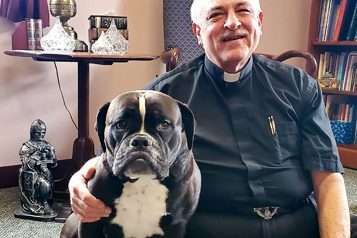By Mike Lang
WILMINGTON, Del. (CNS) — People get pets for all kinds of reasons, and those apply to priests as much as anyone.
Several priests in the Diocese of Wilmington have four-legged companions waiting for them at their homes, and in many cases the pets accompany them to parish events and are part of the fabric of the parish community.
Father Jim Hreha has been a dog owner for decades, always Olde English Bulldogges. Jack, his current canine, is 5 years old and is a fixture at the two Maryland parishes led by Father Hreha — St. Polycarp in Smyrna and St. Dennis in Galena.
“That dog has come into the chancery office, the bishop’s office. That dog goes with me everywhere except for the sacraments,” he told The Dialog, newspaper of the Diocese of Wilmington, which includes nine Maryland counties.
He said his mother told him the dog was the last animal named by God, and it is “God” spelled backward.
In the story of Lazarus, the leper, his sores were licked by dogs. St. Roch, the patron saint of dogs, was befriended by a dog in the forest as he waited in the forest to die from the plague. The dog licked his sores and brought him food, and St. Roch was able to recover.
The Dominican religious order sometimes uses a black and white dog as an informal symbol of the friars and religious sisters.
“A dog shows the nature of God,” Father Hreha said.
The priest worked with dogs while a police officer, so his pets “are always impeccably trained.” That is important when Jack — who weighs 70 pounds — is around parishioners.
“If you’re playing with a 70- or 90-pound dog, you have to be able to trust that that dog is going to mix in with the parishioners and never have a problem. I have that dog trained. He’ll never jump up on anybody. He will lay down on the floor and let a crawler maul him,” he said.
He likes Olde English Bulldogges because of their docile nature and temperament around people. Jack, he said, makes him look better.
“Jack builds my stock. People who think I’m an obnoxious pastor love Jack, and therefore, I become better because of the dog,” he said.
Msgr. Steven Hurley has another big breed, a black Labrador retriever, at St. Thomas the Apostle Church in Wilmington, where he has been pastor for almost 10 years. Jake, a rescue, has been with him almost as long.
The Hurley family always had Labs and German shepherds, so he is used to larger dogs. Msgr. Hurley lives by himself at St. Thomas, so when he moved there, he decided the time was right to get another pet.
“It was the right location and the right time,” he said.
Jake has become a popular fixture at St. Thomas. He has been known to greet people walking by as he is wandering about the backyard, and he gets to know the couples who come in for marriage preparation.
Msgr. Hurley said he took Jake into the church one time when he was cleaning up after a wedding, and the bridal party was still there. Jake went over and kissed the bride.
At funerals, Jake can sense people’s grief.
“He’ll go to them,” Msgr. Hurley said. “They just immediately start petting him. It’s well-known how therapeutic dogs can be. I find it interesting when he sees someone crying or upset, he will move to them.”
For Father John Gayton, pastor of Holy Rosary Parish in Claymont, Delaware, his pets have been lifesavers. He grew up in a large family that always had boxers, but as a military chaplain, he could not commit to a pet because of deployments. After he retired from the military, he decided to adopt a dog.
His first boxer, Zoey, was a fixture in the parish office until her death. Zoey, he said, “was a wonderful gal. She was a rescue, but she really rescued me.”
Father Gayton suffered from post-traumatic stress disorder from his time serving in combat zones. It affected his life back in the Diocese of Wilmington.
“Part of that is isolation, some depression, anxiety, severe ultra-alertness, different things. When I got Zoey, she brought me right out of that. I was coming out of myself, I was laughing a lot more. I developed more energy and more focus, and I was able to accomplish a lot more in the parish,” he said.
Losing her, he continued, was extremely difficult, but he recently adopted Roxie, a boxer who is 5 months old. She is a bundle of energy who loves to run around the yard behind the rectory at Holy Rosary. He knew training her would be a lot of work.
“But she’s a sweetie pie,” he said.
“I try to keep her moving and occupied because otherwise, indoors, she is hyper as can be. She’s all over the place.”
The dog is a bit stuck on herself. “Roxie believes that every human being was created for her pleasure. And she feels the same way about every other dog, that all they want to do is play with her. There’s not a person she doesn’t go to,” Father Gayton said.
According to an article in Science magazine from 2015, the relationship between humans and dogs goes back thousands of years, and research shows “that when our canine pals stare into our eyes, they activate the same hormonal response that bonds us to human infants.”
Msgr. Hurley, who has a bed for Jake in his office in the diocesan chancery, said he read once that dogs are good for the soul. “And I believe that. I think there’s a special bond between humans and dogs. There is something special about that relationship.”
Lang is a reporter at The Dialog, newspaper of the Diocese of Wilmington.



